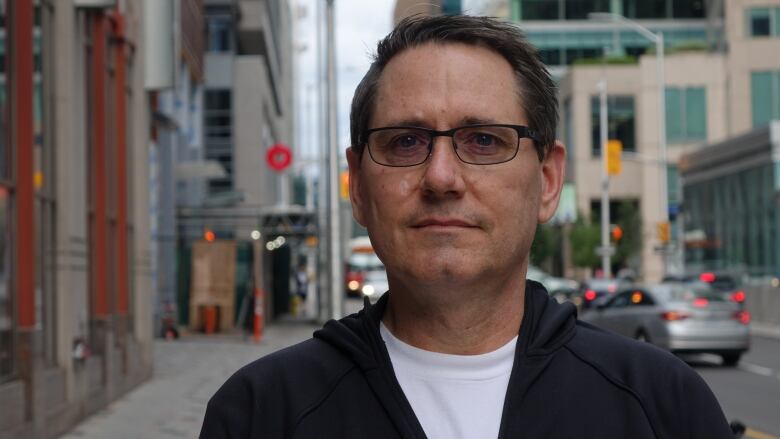A father left behind after his son's overdose
Peter Eady's son Simon died two years ago at the age of 24

Last Friday was Overdose Awareness Day, and to mark the event a crowd gathered at the Human Rights monument on Elgin Street.
They displayed 82 pairs of empty shoes, marking the 82 fatal overdoses in the city last year a number thatrose 28 per cent from 2017.
Among those who attended Friday's ceremony was Peter Eady, who lost his son Simon to an overdose in 2017.
Eady spoke about that experience, and what he feelsneeds to change, with Giacomo Panico, guest host of CBC Radio'sAll InA Day.
Their conversation is below. It's been edited for length and clarity.
It's been two years since the loss of your son. What washe was like?
Peter Eady: He was a happy kid into things like most kids were in that era, in the 90s:Nintendo and Pogs andall that kind of stuff. He liked going out on his bike with his buddies.
But as he got into adolescence, he did develop some anxiety and depressive situations and he did seek treatment for that. That's, I think, the core of maybe why he did what he did or chose to do what he did. [He]was self-medicating and overdosing as a result.
He did struggle with anxiety and depression for several years and he was seeking treatment for that. But I think that was certainly part of the cause.
I know it's difficult, but can you take us back to that day?
He had recently come back from visiting friends in Toronto. He was living in Toronto for a while but then moved back home in 2016.
I went downstairs and he was asleep, and I went out to do some errands. And then I got a call from Kathy, my partner, that she had found him dead in the basement.
I'd been out for a couple hours and obviously, I rushed home to a house full of paramedics and police and my son on the floor, dead on the basement floor
Was there any sense or understanding of what had happened?
From what we know from the coroner's report and talking to his friends, he had got his hands on some prescription opioids and then probably was experimenting with them.
We never knew him to be an opioid user, so it came as a complete surprise to us, obviously.
But unfortunately one of the demographics is that 73 percent of overdoses occur in private dwellings, usually when people are alone. So that's part of the message here:that it can happen in your house.
Do you remember your last conversation with your son?
I came back from Toronto on business with him on the train, and we spent that train ride just talking. Then we had a pizza together and watched a movie, and then we went to bed.
It was a very nice recollection, but it was the last one.
Did you feel helpless? Did you feel like you didn't have a chance?
There's two things there. There's the fact that there's a light, a life, that's cut off prematurely.
I've lost my parents and other people close to me who are older, but when someone who's just on the doorstep of adulthood dies, it's like you cut off a whole potential life.
That's not the same as when you die when you're 80, in my opinion, anyway. And there is the absolute stupidity of a preventable situation.
It's happening once every two hours in Canada, and it's for the most part entirely preventable.
Beyond commemorating the lives lost, why did you want to gather at the human rights monument?
It was about changing policy. And that's certainly something that we have to do. Because first of all,if we just back up a second, we have to talk about shame and stop treating people with mental health issues ordrug or alcohol addictionsas shameful.
We don't shame people with cancer. We don't shame people with AIDS.

But these are all conditions. Some of them are preventable and some of them arrive by choice like, somebody smokes cigarettes their whole life and gets lung cancer.
People judge them, but they don't shame them in the way that they're shaming people who reach for a pill or a needle.
So we have to get rid of that.
And we need to stop incarcerating people and putting people through the police and criminal justice system and give them support mechanisms.
Is there a tangible measure you'd like to propose?
I've been a sort of an anti-prohibitionist absolutistfor a long time, well before my situation.I don't believe prohibition works.
It never has in any jurisdiction it's been tried. I think we do what Portugal or Switzerland did and [decriminalize]it all.
And take all the resources, as Portugal did, from the criminal justice and penal system and move it to safe injection. And [deal with]the the underlying reasons for people's addictions, which are often mental health.
In the U.S., we've seen lawsuits, with the makers of OxyContinnegotiating a multibillion dollar settlement. Should that happen here?
I think so. The pharmaceutical industry has a hand in it. A lot of it is illicit supply coming from outside the country, but in my case, my son died of prescription drug overdose.
- OxyContin maker Purdue Pharma seeking to settle 2,000 lawsuits for up to $12B
- Proposed multi-billion dollar settlement could signal a reckoning for maker of OxyContin
I think we have to address that. And then, like I said, change policy.
Politicians need to to deal with this. It's a crisis. It's getting worse, as they saidat the memorial. The guy from the Sandy Hill Community Centre said it's increasing, not decreasing. We have to address it. And there's measurable ways of doing it.
There's examples from other jurisdictions. We just have to have the political will.












_(720p).jpg)


 OFFICIAL HD MUSIC VIDEO.jpg)
.jpg)



























































































